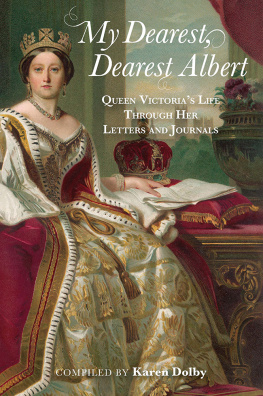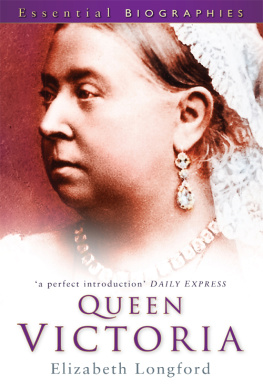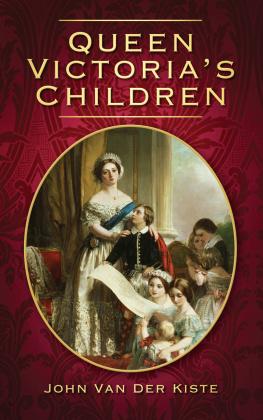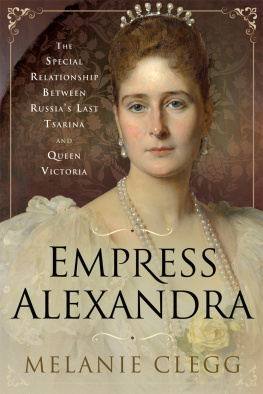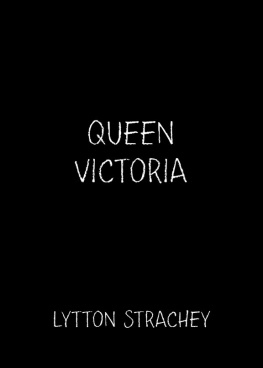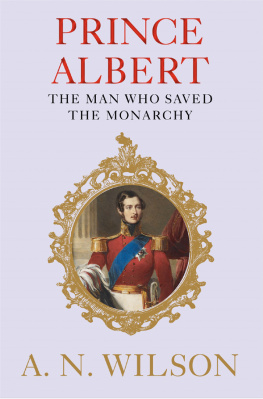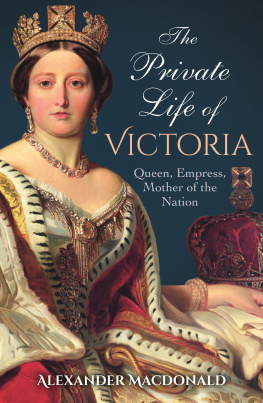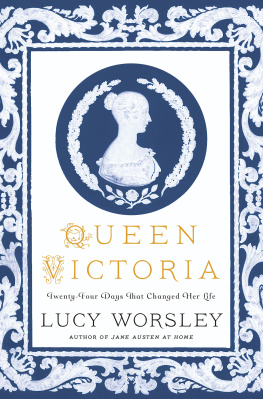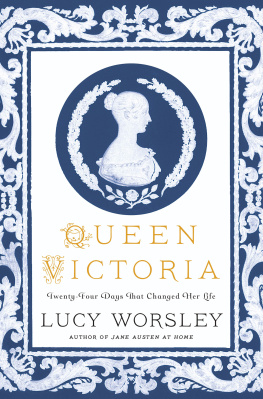VICTORIA AND ALBERT
HECTOR BOLITHO

For copyright reasons, any images not belonging to the original author have been removed from this book. The text has not been changed, and may still contain references to missing images.
First published in Great Britain in 1938 by Cobden-Sanderson Ltd.
This electronic edition published in 2017 by Bloomsbury Reader
Copyright 1938 Hector Bolitho
Cover image Getty Images
The moral right of the author is asserted.
Bloomsbury Reader is an imprint of Bloomsbury Publishing Plc
50 Bedford Square
London
WC1B 3DP
www.bloomsburyreader.com
Bloomsbury is a trademark of Bloomsbury Publishing plc
Bloomsbury Publishing, London, Oxford, New Delhi, New York and Sydney
All rights reserved
You may not copy, distribute, transmit, reproduce or otherwise make available this publication (or any part of it) in any form, or by any means (including without limitation electronic, digital, optical, mechanical, photocopying, printing, recording or otherwise), without the prior written permission of the publisher. Any person who does any unauthorised act in relation to this publication may be liable to criminal prosecution and civil claims for damages.
eISBN: 9781448216840
Visit www.bloomsburyreader.com to find out more about our authors and their books.
You will find extracts, author interviews, author events and you can sign up for newsletters to be the first to hear about our latest releases and special offers.
You can also find us on Twitter @bloomsreader.
Contents
1817
Princess Louise of Saxe-Gotha was married to Prince Ernest of Saxe-Coburg in the summer, when the parched fields were alive with blue chicory flowers and the apple trees, heavy with fruit, sprawled over the roads. She was a child of sixteen, radiating gracefulness and bewitching her surroundings.
Little more than a year before her betrothal, she had been confirmed. After the ceremony, she had thrown herself about her stepmothers neck and burst into tears. But these signs of childhood had passed quickly and she was happy when she drove away from Gotha as a bride. When she and Ernest exchanged rings at the wedding, thirty-six cannon shots had announced the glorious moment to the town and countryside.
As the Prince and Princess travelled along the gaily decked roads to Coburg, everyone shared their pleasure. They were loaded with wreaths and poems. Although Louise was gay, her eyes sometimes filled with tears. In such moments she looked up to the Prince by her side and her mournful doubts gave way to joy. Indeed, there was humour during the journey, for in the evening the peasants sang Hail Duke, Hail Duchess, soon you will rock princes in your lap. Then hail to you. Princess Louise wrote to her dearest friend, Augusta von Studnitz, in Gotha, Is that not funny? I had to think of the Holy Trinity.
Of all the people who waited for her in Coburg, none was as imposing as her mother-in-law, a most remarkable woman, with a powerful, energetic, almost masculine mind accompanied with great tenderness of heart and extreme love for nature.... She had fine and most expressive blue eyes. When Louise first saw her, she said she must really be an angel, since God had given her such a son.
The Duchess watched the young couple nervously and affectionately from the first day when the poor little woman stepped into the room, so exhausted that she could not talk for crying. The Duchess wrote in her diary: It is a charming, tiny being, not beautiful, but very pretty, through grace and vivacity. Every feature of her face has expression; her big blue eyes often look so sad from under her black lashes, and then again, she becomes a happy wild child....I hope she will still grow, as she is very short.... I had half the town to tea because everybody wished to congratulate me.
Among those who greeted Louise was Princess Victoria of Leiningen, afterwards Duchess of Kent. Louise thought her very beautiful, tall and large, very white, black eyes and hair, she is most charming and natural. She presented me with a most pretty bracelet with her name in diamonds. The little Feodora, her daughter, is my whole joy. She jumps with her Aunt Louise, for a wager.
The town of Coburg, to which Louise had come, lay at the foot of the hill upon which the medival feste was built, much as the castle and town of Windsor lie together in the valley of the Thames. The castle was not lived in, and the Ducal family divided their time between several immense and ornate palaces in other parts of the country. Schloss Ehrenburg was their house in Coburg and Schloss Rosenau was their small country home. This was four miles away: a quiet retreat surrounded by forests and fields.
Four days after her wedding Princess Louise wrote: We heard a bad sermon, which contained nothing but praises of my Prince, with no religious thought.... The man is not wrong, only such a thing is not suitable in church. Then there was a big dinner at which I appeared in a pink and silver dress, with a train.
Prince Ernest took Louise to Rosenau in the evening. The gardens were illuminated, Chinamen danced, and nymphs, appearing from grottoes, presented her with poetic addresses. When Louise descended the stairs to the ballroom, her way was lined by beautiful children on pedestals, dressed as gods and scattering flowers. On the fifth clay she was so exhausted that she had to spend the whole of the morning in bed. All my relatives came to visit me, she wrote.
There was no pleasure she did not share with her friend Augusta in Gotha. You will get a fright, she wrote from Rosenau, when you receive this letter.... You will count the pages and cry out again, the Gossip! Will she never hold her tongue? I risk all this, and yet the thought gives me great pleasure, to talk and joke with you, to tell you how happy and contented and joyous I am.... If one loves an Angel, ones master and husband, one is much softer and more tender, more susceptible, and warmer also for friendship.
In the evening, Louise would sit with Ernest in the garden. She would watch the dark clouds changing their shapes as they drifted towards the distant castle. Her little hand would be curled within the bigger hand of her husband and, sitting thus, they would talk. A calm moon, the chuckle of the stream, the warm, still night... she would sigh and lean closer to him because even in her happiness she was lonely. She needed her friend. One night she pressed Ernests hand and said: If only Augusta could enjoy the quiet and beautiful evening with me. With you and she it would be too lovely. Ernest calmed her. He thinks you will come to me, she wrote to Augusta. Can I hope?
About this time the Duchess of Saxe-Coburg recorded an event which changed the fortunes of many princes in England and Germany. The Courier has arrived, she wrote in her diary. Charlotte is dead! Good God! I cannot realise the gigantic tragedy. I cannot bear it. Poor, poor Leopold! She is dead, the beautiful, charming, good woman, the hope of a large population over which she would have ruled. Her death ruins the whole life happiness of Leopold. Gods ways are wonderful, often terrible. No mortal can understand why this beautiful flower should fade at the morning of her life and drop off without fruit, with which she would have blessed her country.
A month after the death of Princess Charlotte, the Duke of Kent met Creevey in Brussels. It was then that he laid down the terms upon which he would be willing to marry, in the hope of giving an heir to the British throne.
The Duke of Kent had lived faithfully and happily with his mistress, Madam Saint Laurent, for twenty-seven years, in all climates and in all difficulties together. If he married for the sake of the succession, it meant that he would have to abandon the woman who loved him for the cold experiment of marriage to a Princess he did not know. It was possible that he would lose all and gain nothing but financial benefits from the country. The nation... is greatly my debtor, he said, and it is to his credit that when he married Princess Victoria, widow of Prince Charles of Leiningen, he was a faithful husband. He expelled his mistress and observed all the laws of domestic decency.


